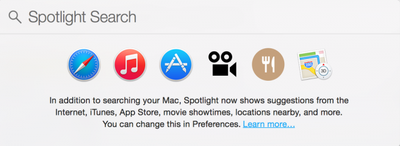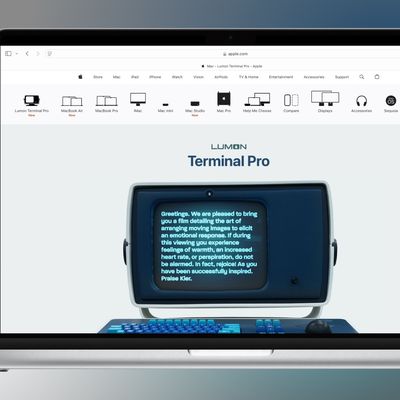OS X Spotlight Glitch Exposes IP Addresses and Other System Details to Spammers
A privacy glitch in Spotlight search for OS X may leak private details, including IP addresses, to email spammers. The flaw was first reported by German tech news site Heise and replicated in tests performed by IDG News Service.

The issue affects OS X mail users who have followed conventional security recommendations to turn off the "load remote content in messages" option in the Mail app. This setting prevents the loading of remote content such as images, including "tracking pixels" that are used by spammers to harvest information when people open an email.
A glitch arises when OS X Mail users utilize Spotlight search in OS X, which includes emails in the search results. Spotlight ignores the remote content block preference from Mail and loads the remote email files as part of the search process. Once Spotlight loads one of these tracking pixels, spammers can glean details such as the IP address, OS X version, browser details, and the version of Quick Look being used.
The Spotlight preview loads those files even when users have switched off the "load remote content in messages" option in the Mail app, a feature often disabled to prevent email senders from knowing if an email has arrived and if it has been opened. What's more, Spotlight also loads those files when it shows previews of unopened emails that landed directly in the junk folder.
Currently, the only way to block this information leak is to block Spotlight from including emails in search results entirely by opening System Preferences and unchecking the "Mail & Messages" option for Spotlight. Apple has yet to comment on this Spotlight privacy glitch.
Popular Stories
While the iPhone 17 Pro and iPhone 17 Pro Max are not expected to launch until September, there are already plenty of rumors about the devices.
Below, we recap key changes rumored for the iPhone 17 Pro models as of March 2025:
Aluminum frame: iPhone 17 Pro models are rumored to have an aluminum frame, whereas the iPhone 15 Pro and iPhone 16 Pro models have a titanium frame, and the iPhone ...
Apple is expected to release iOS 18.4 to the general public as soon as next week, following more than a month of beta testing.
Apple's website says some iOS 18.4 features will be released in "early April," so the update should be out as early as Tuesday, April 1.
Apple this week seeded the iOS 18.4 Release Candidate, which is typically the final beta version, barring the discovery of any...
Leaker Jon Prosser today shared a mockup of what he says the Messages app will look like in iOS 19, demoing an interface with rounded, translucent bubble-shaped navigation buttons at the top and softer, rounder corners for the keyboard and word suggestions.
Jon Prosser's Messages app mockup
The return button, a button for going back to the Messages list, and the FaceTime button have a deeper...
If you pay for iCloud storage on your iPhone, Apple has a new perk for you, at no additional cost.
The new perk is the ability to create invitations in the Apple Invites app for the iPhone, which launched in the App Store last month.
In the Apple Invites app, iCloud+ subscribers can create invitations for any occasion, such as birthday parties, graduations, baby showers, and more. Anyone ...
Apple regularly refreshes the MacBook Pro models, and a new version that uses M5 series chips is in the works. Apple just finished refreshing most of the Mac lineup with M4 chips, and now it's time for the M5. Rumors suggest that we could see the first M5 MacBook Pro models this fall.
Design
There have been no rumors of a design update for the M5 MacBook Pro models that are coming this...
Apple today announced that AirPods Max with a USB-C port will be gaining support for lossless audio and ultra-low latency audio with a firmware update next month, alongside the release of iOS 18.4, iPadOS 18.4, and macOS 15.4.
For context, audio files are typically compressed to keep file sizes smaller. There are lossy compression standards like MP3 and AAC (Advanced Audio Codec), which...
Apple is going all out with promotions for the popular Severance Apple TV+ show today, and as of right now, you'll find a new "Lumon Terminal Pro" listed on Apple's Mac site.
The Lumon Terminal Pro is designed to look similar to the machines that Severance employees like Mark S. and Helly R. use for macrodata refinement. The Terminal features a blue keyboard, a small display with wide...
The iOS 19 mockup images that leaker Jon Prosser shared today are not representative of the actual iOS 19 design, Bloomberg's Mark Gurman said on social media.
According to Gurman, the images that are "floating around" are based on "very old builds" or "vague descriptions," and are lacking key features. Gurman says that we can "expect more from Apple in June."
Gurman made the same comment ...























